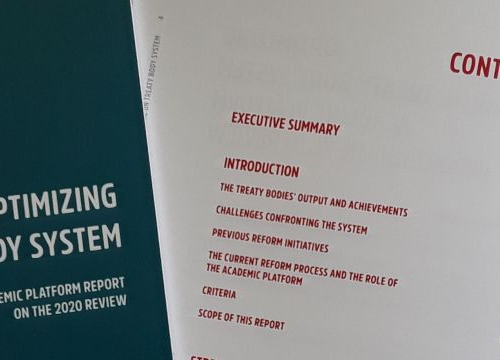Optimizing UN Treaty Bodies: Wide Support to the Recommendations Emanating from our Academic Platform


Geneva Academy
18 June 2019
Reports submitted by states in the context of the upcoming review of United Nations (UN) Treaty Bodies (TBs) by the UN General Assembly highlight wide support to the recommendations emanating from the Academic Platform on Treaty Body Review 2020 and presented in our publication Optimizing the UN Treaty Bodies System.
‘An analysis of the 54 states’ submissions highlights large support across all continents and regional groups to our main recommendations to improve the work of UN TBs ’ underlines Felix Kirchmeier, Coordinator of the Geneva Human Rights Platform.
From Clustered Reviews to a more Coordinated Set of Working Methods
‘We were very pleased to see that four states – Costa Rica, Germany, Sweden and Switzerland – explicitly welcomed and supported the analysis and proposed solutions described in our publication’ explains Felix Kirchmeier.
Besides this explicit support, key recommendations of the academic platform are present in a number of state submissions:
- 20 states consider worthwhile to further explore the possibility for clustered reviews as a means to enhance the effectiveness of state party reporting
- 35 States encourage all treaty bodies to continue their efforts towards a more coordinated set of working methods
- 26 states support the development by the Office of the UN High Commissioner for Human Rights of a master calendar coordinated across all TBs
- 21 states recommend improving the use of information technology throughout the TB system
- 26 states propose stronger synergies with the wider UN human rights system as well as with regional human rights mechanisms.
‘Overall, such a large endorsement of our recommendations is very encouraging as this review constitutes a historical opportunity to make the work of TBs more efficient’ underlines Domenico Zipoli, Associate Researcher at the Geneva Academy.
‘This is also very encouraging for our recent publication on TBs’ individual communication procedures, Treaty Bodies’ Individual Communication Procedures: Providing Redress and Reparation to Victims of Human Rights Violations, which outlines a series of key recommendations to improve the system’ adds Kamelia Kemileva, one of the authors of this report.
About the Publication
Optimizing the UN Treaty Bodies System outlines a series of detailed and innovative solutions for optimizing the UN TBs system.
This work is the outcome of a three-year consultative process coordinated by the Geneva Academy – The Academic Platform on Treaty Body Review 2020 – to collect academic inputs and ideas for the 2020 review via the creation of an academic network of independent researchers, a call for papers, a series of regional consultations, annual and expert conferences, as well as ongoing interactions with key stakeholders: states, treaty bodies, national human rights institutions, civil society organizations and the Office of the UN High Commissioner for Human Rights and other parts of the UN.








